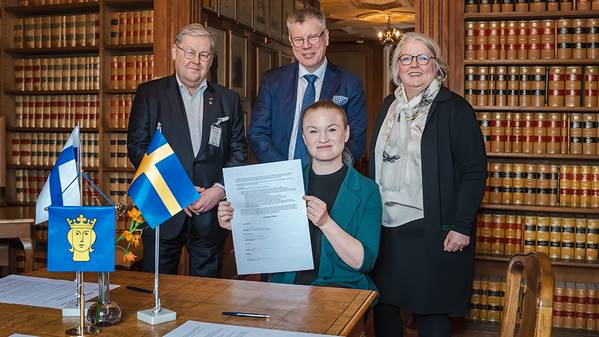
Ports of Stockholm, Port of Turku and Viking Line have formally entered into partnership to create a green shipping corridor between Turku and Stockholm, which will be fossil fuel-free by 2035 at the latest. The result will be a framework with scalable solutions for the transition to fossil-free fuels and shipping with low climate impact.
A memorandum of understanding (MoU) was signed on February 6, with the parties agreeing to establish a green shipping corridor by 2035 at the latest, the goal being an entirely fossil-fuel greenhouse gas emissions-free corridor.
“Climate change is happening here and now. It is more important than ever to take tangible steps towards a green transition. We know that more transport by rail or sea is needed rather than by road and air. Green shipping plays a major role in climate transition measures in the transport sector,” said Clara Lindblom, City Council responsible for Ports of Stockholm.
“Viking Line is a shipping company that has its roots in the vulnerable archipelago. That means that for us the work of protecting and preserving the Baltic Sea is part of our DNA. We strive to be an ambitious role model in the industry and proud of taking this step together with Ports of Stockholm and Port of Turku to come closer to achieving fossil fuel-free cruises and transport in this important shipping fairway between Sweden, the Åland Islands and Finland,” said Viking Line CEO, Jan Hanses.
The project and partnership qualifies as a green shipping corridor according to the Clydebank Declaration, of which both Sweden and Finland are signatories. This undertaking is well in advance of the EU's Fit for 55 strategy time line.
“Environmental work has always been a focus of our business operations. The Port of Turku nestles within a very vulnerable archipelago. This gives us the responsibility of respecting our surroundings at all times in our daily activities. In 2023 we signed Turku’s Climate City Contract, which has the goal of the city being carbon neutral by 2029. This is a goal we are working systematically to achieve and is why this memorandum to develop a green transport corridor between Turku and Stockholm is a natural step for us,” said Erik Söderholm, CEO Port of Turku.
The partnership will act as an innovative platform to develop scalable solutions for phasing out fossil fuels and enable green shipping between Stockholm and Turku. The project will also leverage the advances and solutions in the Decatrip project, a collaboration between Rauma Marine Constructions, Viking Line, Åbo Akademi University and Kempower.
During the project the partners will successively reduce their carbon dioxide emissions and work towards creating an entirely fossil fuel-free corridor. The collaboration may also expand to involve other key stakeholders in the shipping industry, as well as other relevant ports, cargo owners and forwarding companies.



